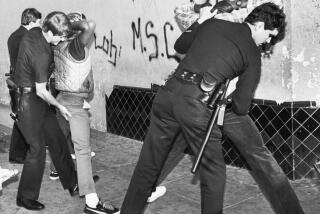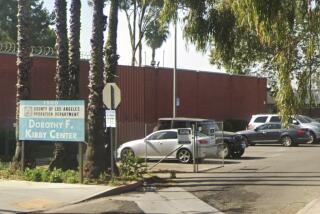Treating them as victims, not criminals

Two years ago, Los Angeles County probation officer Michelle Guymon was asked to help child abuse experts study human trafficking.
She imagined a globe-trotting break from 23 years in the trenches managing law-breaking teens. “I figured I’d be traveling the world,” she said.
But Guymon never left home. The human trafficking victims she studied were local girls forced into sex — not much different from the hundreds she’d encountered in juvenile hall, locked up and punished for working the streets.
“That was an ‘aha’ moment for me,” she recalled.
Guymon had spent years in the county’s probation camps “working with young girls who had come into the system as a result of a prostitution-related offense. But I never really saw those girls as being sexually exploited.”
“I had more of a judgment thing: ‘You need to quit that. This is not a good thing to be doing.’ I thought I was a good therapist, but I missed it,” she said.
“I didn’t make the correlation with the girls I had been working with: These are the girls being sexually exploited. This is not just some bad choice they made.”
That was then. Now Guymon is serving on a county task force charged with translating that insight into policy.
Its goal? Finding ways to keep young girls out of prostitution, and young prostitutes out of the criminal justice system. Treating them, finally, not as criminals but victims.
::
The task force, proposed last week by Supervisor Mike Antonovich, is a product of three forces:
Proposition 35’s landslide approval last month toughens penalties for those convicted of forcing minors into sex work and makes it harder to prosecute teenage prostitutes. At the same time, local law enforcement and child abuse agencies have been joining forces with international anti-human trafficking groups.
And officials recently learned that more than half of juveniles arrested in Los Angeles County on prostitution-related charges have been under the care and supervision of the Department of Children and Family Services, the county’s child welfare arm.
“There’s a huge link to foster care,” Guymon told me. “These are the kids that run away, find themselves on the street with nowhere to sleep or eat, and no one to take care of them.”
Many have already been abused and taken from their families. Some are living in group homes where they feel unloved or ignored. “Pimps know that and prey on that,” Guymon said. “We’ve had girls 11 and 12 years old, who get sucked in by ‘I’ll never do what your father did. I’ll take care of you. I love you.’ ”
LAPD Lt. Andre Dawson said many of the pimps are gang members, who follow up the sweet talk with beatings or threats. “They tell her she’s pretty, she can be the next video model.... By the time she realizes she’s being manipulated, it’s hard for her to get out.”
Dawson has spent the last two years working with the FBI’s sex trafficking project, Innocence Lost. He doesn’t talk about “arresting” young prostitutes anymore, but about “rescuing” children and helping them “recover.”
But the practical challenges of that approach are bigger than a vocabulary shift, especially when it comes to young people in the foster care system.
What do you do with a 14-year-old who propositions a vice cop?
Lock her up like a criminal and at least you know she’s safe for a while. Return her to a foster home and she’ll probably be back on the streets with her pimp before long.
“We’ve got to expect her to run,” Guymon explained. “She’s running out of fear .... or she’s running out of love. ‘He’s the only person who loves me.’ We hear that a lot.”
::
This is clearly not one of those make-a-policy, solve-a-problem issues. “People are looking for this big magic to happen. But we’ve got to be up for the fight,” Guymon said.
A 14-year-old in hot pants on a corner at 2 a.m. needs more than a lecture and a jail cell, more even than a change of clothes and a promise that someone cares. She needs changes in a system that’s failing to reform streetwise teens and protect vulnerable girls.
“We give up too easily,” Guymon admitted. “That pimp will drive from Long Beach to Lancaster at 2 in the morning to pick her up. But if she calls her probation officer, he probably doesn’t have his phone on.”
And if she tries to go back to foster care, she won’t be allowed in some group homes and might risk being sexually assaulted in others.
Foster care officials say they’re working on that. “We need to do a better job in looking at these group homes,” acknowledged social worker Xiomara Flores-Holguin. “If a girl says ‘I don’t feel safe there,’ we’ll look for a place that’s good for her.”
The probation department has work to do, too, through new programs to train juvenile hall staff and educate girls about what Guymon calls “pimp tactics.”
“The whole victim-versus-criminal thing is what we have to deal with,” she said. “It’s time for law enforcement to say, we’re not going to criminalize these girls. These girls are being beaten, exploited, coerced.... We are going after the traffickers.”
More to Read
Start your day right
Sign up for Essential California for news, features and recommendations from the L.A. Times and beyond in your inbox six days a week.
You may occasionally receive promotional content from the Los Angeles Times.






